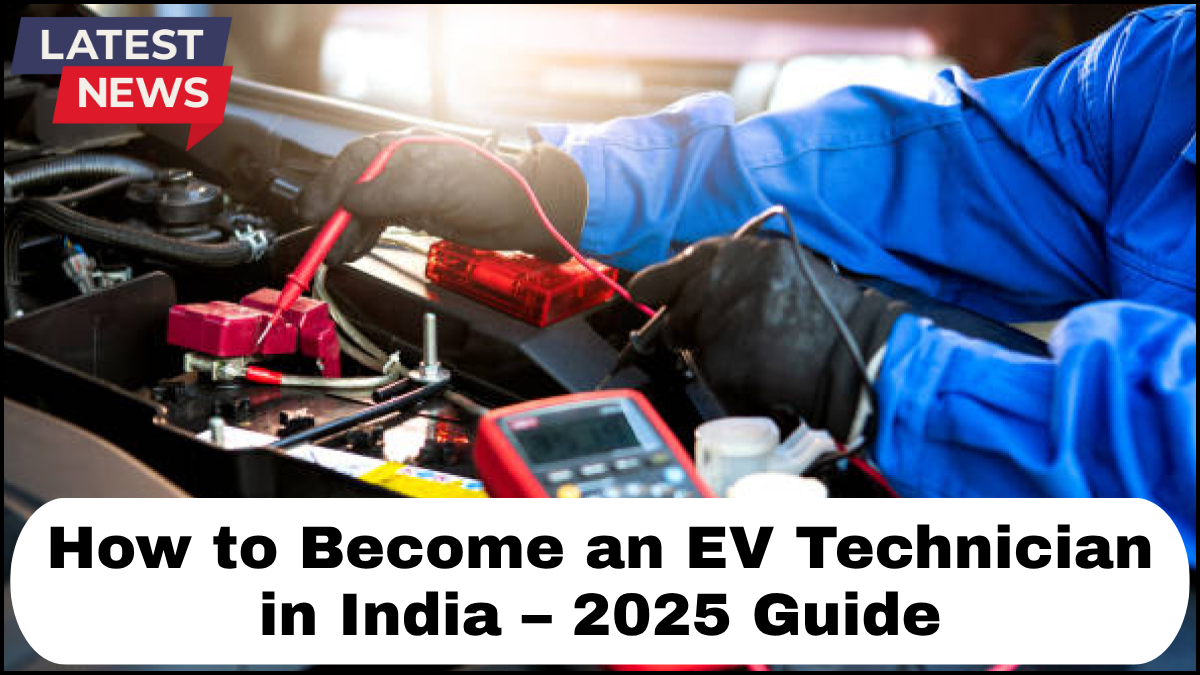With India rapidly adopting electric mobility, the demand for skilled professionals in the EV sector is surging. As automakers shift toward sustainable transportation, EV technician careers in 2025 are becoming one of the most promising technical professions in the country. If you’re considering a future-proof career in a booming industry, becoming an EV technician might be your best move.
This guide covers everything you need to know—skills, education, certification, and job opportunities—to start your journey as an EV technician in India by 2025.

What Does an EV Technician Do?
An Electric Vehicle (EV) technician is responsible for assembling, maintaining, diagnosing, and repairing electric vehicles and their components. Their job often includes:
-
Installing and calibrating battery systems
-
Troubleshooting electrical and electronic faults
-
Performing software diagnostics
-
Maintaining motor controllers and regenerative braking systems
-
Ensuring compliance with EV safety protocols
The role demands a solid grasp of both electrical engineering and automotive fundamentals, plus hands-on experience with EV systems.
Why EV Technician Careers Are in High Demand in 2025
The Indian government’s push for electric mobility—via policies like FAME II and PLI schemes—has accelerated EV manufacturing, sales, and infrastructure development. As a result:
-
Major OEMs like Tata Motors, Ola Electric, and Mahindra are investing heavily in EV production.
-
EV charging networks are expanding rapidly in urban and semi-urban areas.
-
Demand for qualified service personnel and technicians is outpacing supply.
By 2025, EV technician roles will no longer be niche—they’ll be a central pillar in India’s automotive workforce.
Step-by-Step Guide to Becoming an EV Technician in India
1. Complete Relevant Educational Qualifications
Start with a minimum of a 10th or 12th standard pass. From there, you can choose one of the following paths:
-
ITI/Diploma in Electrical or Automotive Engineering
-
B.Tech/B.E. in Electrical, Electronics, or Mechatronics (optional but advantageous)
Vocational training plays a crucial role. Several institutes are now offering specialized programs tailored to EV technologies.
2. Enroll in Student Training for EV Technician Skills
Look for certified student training EV technician programs that focus specifically on electric vehicle systems. These are often short-term, hands-on courses that include:
-
Battery Management Systems (BMS)
-
EV motor technologies (BLDC, PMSM, etc.)
-
CAN communication protocols
-
Charger installation and troubleshooting
-
EV safety and hazard control
Popular training institutes in India include:
-
Automotive Skills Development Council (ASDC)
-
Skill India programs under NSDC
-
OEM-backed training academies (e.g., Tata Skills, Hero Electric Academy)
3. Get Certified
Although not mandatory, certifications boost employability. Some highly regarded certifications include:
-
ASDC Certified EV Technician
-
EV Maintenance & Servicing Certification by MSME Technology Centres
-
International certifications from Bosch, ARAI, or SAE India
These not only validate your skills but also open doors for advanced roles.
4. Build Hands-on Experience
Practical experience is vital in the EV space. Try:
-
Apprenticeships at EV workshops or dealerships
-
Internships with EV startups or service centers
-
Freelance work for retrofitting and battery repairs
EV technician career success in 2025 will depend heavily on real-world, workshop-based exposure.
5. Stay Updated with Emerging Technologies
The EV industry evolves fast. Keep learning about:
-
AI-integrated diagnostics
-
Vehicle-to-grid (V2G) technology
-
Fast-charging systems
-
Solid-state battery developments
Continuous learning ensures you stay competitive and in demand.
Career Opportunities and Salary Expectations
EV technicians can find employment in a variety of sectors:
-
EV manufacturers and OEMs
-
After-sales service centers
-
Battery manufacturing units
-
Charging infrastructure companies
-
Fleet operators (e.g., electric taxis, delivery services)
Entry-level EV technicians can expect salaries ranging from ₹15,000 to ₹25,000 per month. With experience, advanced skills, or certifications, this can scale up to ₹50,000 or more in supervisory or diagnostic roles.
Key Skills Required
-
Strong understanding of electrical circuits and safety
-
Ability to read wiring diagrams and technical schematics
-
Proficiency in using diagnostic tools
-
Mechanical aptitude and physical dexterity
-
Communication skills for client interactions
Final Thoughts
India’s electric vehicle revolution is creating unprecedented job opportunities. By equipping yourself with the right education, training, and certifications, you can launch a solid EV technician career in 2025 and beyond. The earlier you start, the better positioned you’ll be to ride this electrifying wave.
Frequently Asked Questions (FAQ)
Q1: Is a degree necessary to become an EV technician in India?
Not necessarily. While a diploma or ITI in electrical or automotive fields is beneficial, hands-on training and certifications are more important in most cases.
Q2: How long does it take to become an EV technician?
With a focused vocational course, you can become job-ready in 6 to 12 months, depending on the program’s intensity and your prior knowledge.
Q3: Can I switch from a traditional auto mechanic role to an EV technician role?
Yes, many existing mechanics are upskilling through EV training programs. Your mechanical knowledge gives you a strong base to build EV expertise.
Q4: Are there online EV technician training courses in India?
Yes, platforms like ASDC, Skill-Lync, and even Coursera offer remote learning options, although in-person training is recommended for practical skills.
Q5: What is the future scope for EV technicians?
Excellent. With India’s EV market projected to grow exponentially, certified technicians will remain in high demand across the country.
click here to learn more